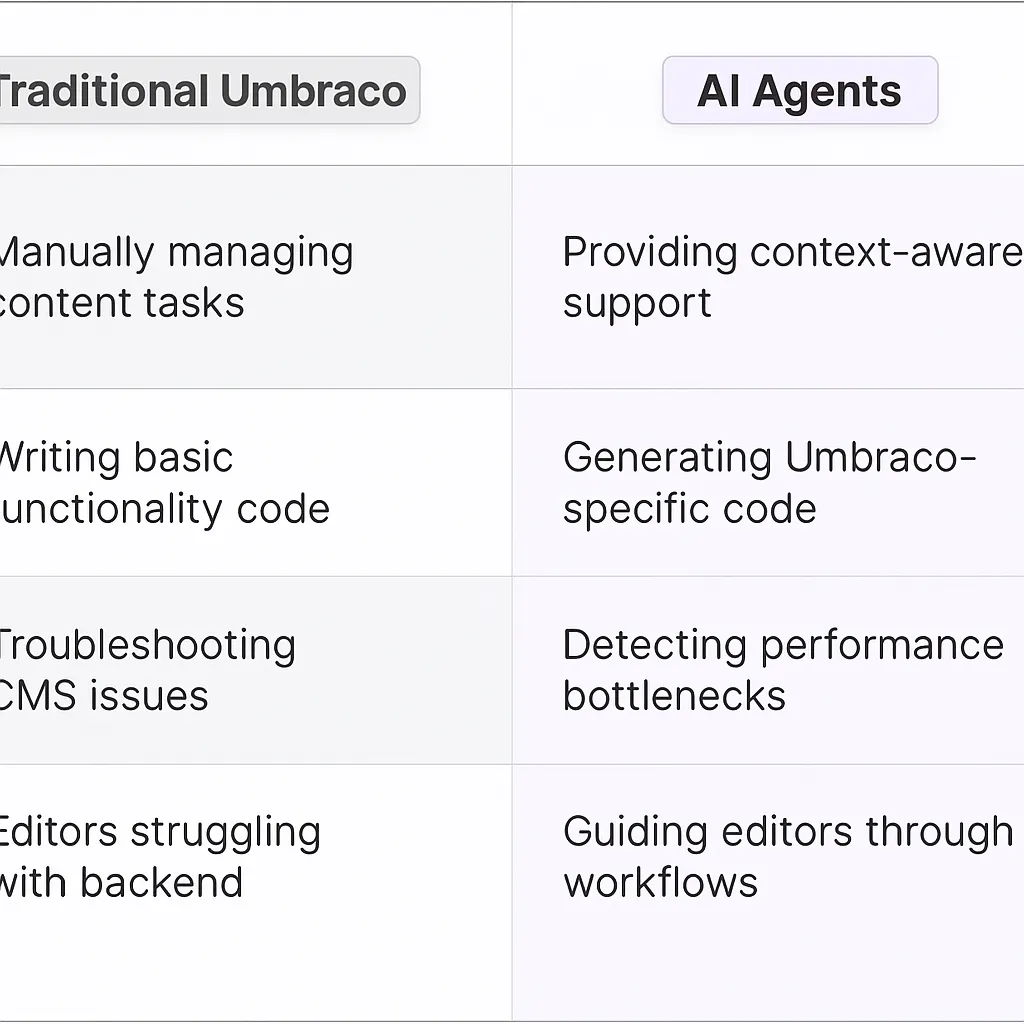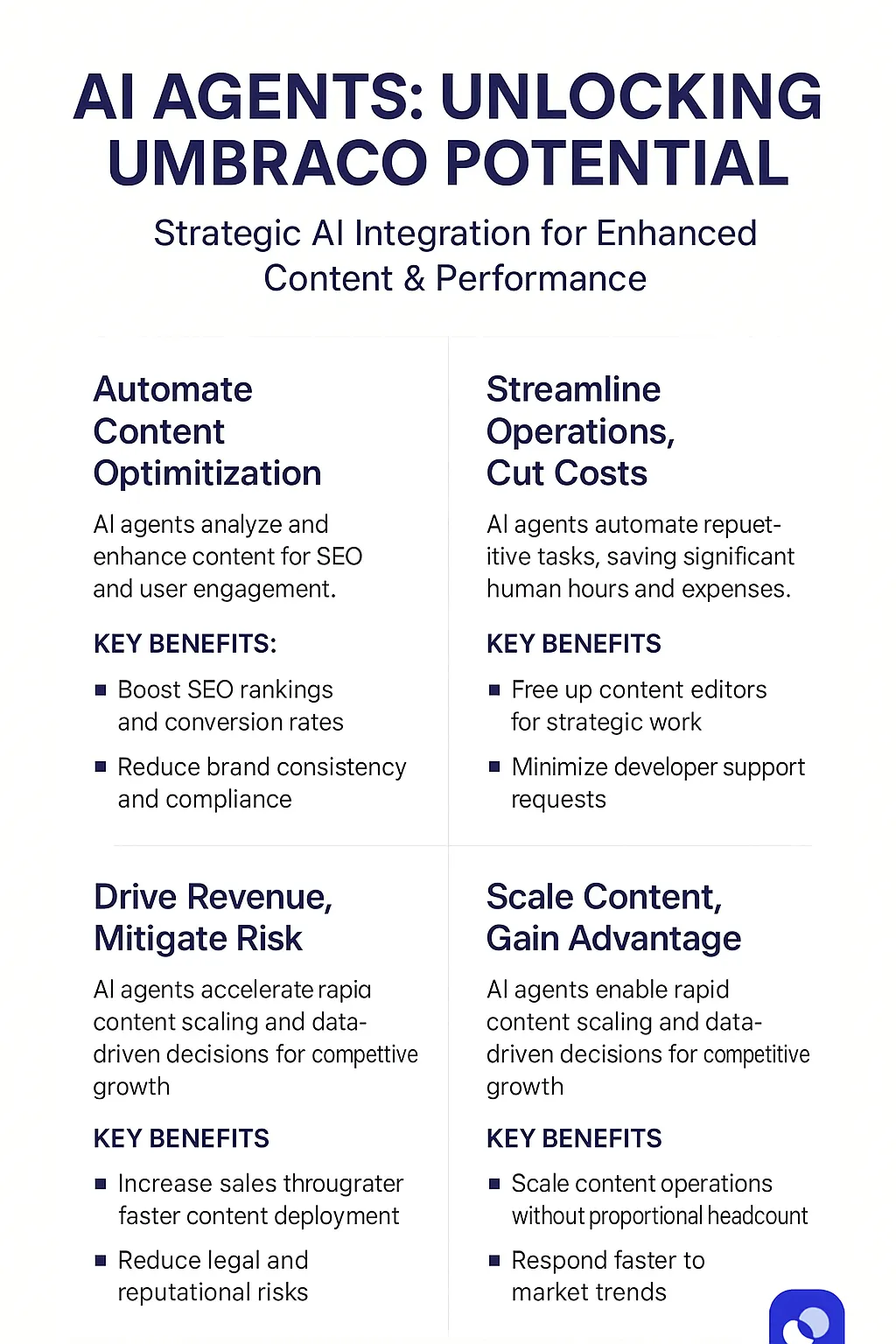Umbraco
Understanding Umbraco's Core Platform and Features
What is Umbraco?
Umbraco stands as an open-source content management system built on the .NET framework, powering over 500,000 websites worldwide. This flexible CMS provides a robust foundation for creating and managing digital content, from simple marketing sites to complex enterprise applications. Its modular architecture and extensive API support make it particularly well-suited for AI integration.
Key Features of Umbraco
The platform excels through its intuitive content editing interface, powerful template engine, and extensive customization options. Core features include:
- Flexible content modeling with custom document types
- Built-in media management system
- Granular user permissions and workflow controls
- Multi-language support
- Extensive API capabilities for third-party integrations

Benefits of AI Agents for Umbraco
What would have been used before AI Agents?
Traditional Umbraco development required developers to manually handle content management tasks, write custom code for basic functionality, and spend countless hours troubleshooting common CMS issues. Teams relied on extensive documentation, community forums, and trial-and-error approaches to solve problems. Content editors faced steep learning curves when managing the backend, often requiring developer intervention for routine tasks.
What are the benefits of AI Agents?
AI Agents transform the Umbraco development ecosystem by providing intelligent, context-aware support that fundamentally changes how teams build and maintain websites. These digital teammates can:
- Generate optimized Umbraco-specific code snippets, reducing development time by up to 60% for common functionality
- Automatically detect and diagnose performance bottlenecks in content delivery, suggesting targeted optimizations based on actual usage patterns
- Guide content editors through complex workflows with real-time suggestions and automated quality checks
- Convert legacy code to modern Umbraco standards while maintaining functionality and improving security
- Create and maintain documentation that evolves with your codebase, ensuring knowledge transfer across team members
The network effects are particularly powerful - as more developers interact with AI Agents, the knowledge base expands exponentially, creating a flywheel of increasingly sophisticated solutions for the entire Umbraco community. This represents a step-function improvement in developer productivity, not just an incremental gain.
For content teams, AI Agents serve as expert guides, eliminating the traditional barriers between technical and non-technical users. They can suggest optimal content structures, automate SEO optimization, and provide intelligent content recommendations based on user engagement patterns.

Potential Use Cases of AI Agents with Umbraco
Content Management Processes
AI Agents transform how teams work with Umbraco's content management system by handling repetitive tasks that typically consume hours of developer and content editor time. These digital teammates can automatically generate meta descriptions, suggest SEO-optimized headlines, and maintain consistent formatting across content blocks.
When integrated with Umbraco's backend, AI Agents can analyze content performance patterns and provide data-driven recommendations for content optimization. They monitor metrics like engagement rates, conversion paths, and user behavior to suggest strategic content adjustments.
Development Tasks
Developers working in Umbraco benefit from AI Agents that can generate code snippets for custom modules, debug common issues, and maintain documentation. The agents scan through existing codebases to identify optimization opportunities and suggest improvements aligned with Umbraco best practices.
For complex implementations, AI Agents serve as real-time coding partners, offering solutions for template modifications, custom widget development, and integration challenges. They can analyze performance bottlenecks and propose architectural improvements specific to Umbraco's framework.
Content Creation and Optimization
AI Agents excel at scaling content operations within Umbraco installations. They can draft initial content versions, translate content across multiple languages, and ensure brand voice consistency throughout the site. The agents learn from existing content patterns to maintain stylistic coherence while adapting to different content types and purposes.
These digital teammates also handle technical SEO tasks by automatically generating XML sitemaps, optimizing image alt tags, and ensuring proper header hierarchy across pages. They monitor content freshness and flag outdated information for review.
Workflow Automation
Teams can deploy AI Agents to orchestrate complex publishing workflows in Umbraco. The agents manage content approval chains, schedule publications, and coordinate between different team members. They track version histories, manage content rollbacks, and maintain audit trails of all content changes.
For multi-site installations, AI Agents coordinate content syndication, ensuring consistent brand messaging while adapting content for different regional or brand-specific requirements. They monitor content synchronization and flag any discrepancies that require human attention.
User Experience Enhancement
AI Agents analyze user interactions to optimize site navigation and content discovery. They process user feedback, search patterns, and behavioral data to suggest improvements to site structure and content organization. The agents can also personalize content delivery based on user preferences and browsing history.
Through continuous monitoring of user engagement metrics, these digital teammates identify opportunities for A/B testing and provide recommendations for optimizing conversion paths within the Umbraco environment.

Industry Use Cases
AI agents are transforming how teams work with Umbraco CMS across multiple sectors. The integration of AI capabilities into Umbraco's ecosystem creates opportunities for both technical and non-technical teams to enhance their content management processes. From healthcare organizations managing complex medical content to global retailers maintaining multi-language product catalogs, these digital teammates are proving invaluable.
What makes AI agents particularly effective in Umbraco environments is their ability to understand context and handle complex content structures. They can work within Umbraco's document types, properties, and templates while maintaining the platform's flexibility and extensibility. This deep integration means teams can focus on strategic decisions while AI handles repetitive content tasks.
The real power comes from how these AI agents adapt to specific industry needs. They're not just generic tools - they understand industry-specific terminology, compliance requirements, and content standards. This specialized knowledge, combined with Umbraco's robust CMS capabilities, creates a powerful system for managing digital content at scale.
AI Agents Transform Healthcare Content Management with Umbraco
Healthcare organizations face unique challenges in managing vast amounts of medical content while maintaining strict compliance and accuracy standards. AI Agents integrated with Umbraco CMS create a powerful system for healthcare providers to deliver precise, up-to-date information to patients and staff.
When a hospital network deploys AI Agents within their Umbraco environment, the impact ripples across multiple content workflows. These digital teammates can automatically review medical procedure descriptions, ensuring they align with the latest clinical guidelines. They flag outdated terminology, suggest current medical nomenclature, and maintain consistency across thousands of pages.
The real magic happens in content creation and updates. For example, when new research emerges about a treatment protocol, AI Agents can draft preliminary content updates, cite relevant medical sources, and route these changes through the appropriate approval channels. This reduces the burden on medical staff while maintaining high standards of accuracy.
Beyond technical content, AI Agents excel at making complex medical information more accessible to patients. They can analyze readability levels, suggest plain language alternatives, and ensure content meets health literacy guidelines - all while preserving medical accuracy. This capability is particularly valuable for large healthcare networks managing content across multiple facilities and specialties.
The ROI becomes clear when considering the reduction in manual content reviews and the acceleration of update cycles. A process that typically took weeks - updating procedure descriptions across hundreds of pages - can now be completed in days, with higher accuracy and consistency.
Healthcare providers using this approach report significant improvements in content accuracy, reduced workload for medical staff, and better patient engagement with their digital resources. The combination of Umbraco's robust CMS capabilities and AI Agents' specialized skills creates a content management system that truly serves both healthcare providers and patients.
AI Agents Power E-commerce Content Scale with Umbraco
E-commerce brands face relentless pressure to maintain fresh, engaging product content across thousands of SKUs. The integration of AI Agents with Umbraco creates a force multiplier for digital merchandising teams trying to keep pace with rapid inventory changes and seasonal demands.
The most successful e-commerce implementations leverage AI Agents to transform basic product data into compelling stories. When a retailer loads new inventory into Umbraco, these digital teammates automatically generate rich product descriptions, incorporating key features, materials, and use cases. They maintain consistent brand voice while creating unique content for each item - no more duplicate descriptions that hurt SEO.
A major outdoor retailer deployed this approach across their 50,000+ product catalog. The AI Agents analyze technical specs, customer reviews, and category data to craft descriptions that actually drive conversions. They identify key selling points, emotional triggers, and seasonal relevance that human writers might miss when racing through high volumes of content.
The system really shines during major shopping events like Black Friday. AI Agents can rapidly refresh thousands of product pages with holiday-specific messaging, promotional details, and urgency drivers. They maintain accuracy on inventory levels and pricing while adding the emotional hooks that drive purchases.
Smart e-commerce teams use AI Agents to localize content at scale. When expanding to new markets, the system can adapt product descriptions for regional preferences, local regulations, and cultural nuances - all while preserving the core product information. This level of personalization used to require massive teams of writers and translators.
The metrics tell the story: retailers using AI-enhanced Umbraco report 40-60% faster time-to-market for new products, 30% higher conversion rates on optimized pages, and significant reduction in content production costs. For e-commerce brands competing in a crowded market, this combination of speed, scale and quality creates real competitive advantage.
Considerations and Challenges
Implementing AI agents within Umbraco environments requires careful navigation of both technical and operational hurdles. The integration complexity stems from Umbraco's unique architecture and the need to maintain its core content management capabilities while adding AI functionality.
Technical Challenges
Memory management becomes critical when running AI models alongside Umbraco's content delivery systems. Large language models can consume significant resources, potentially impacting the CMS's performance. Developers need to implement efficient caching strategies and consider API rate limiting to prevent system overload.
Version compatibility presents another obstacle. Umbraco's frequent updates may conflict with AI integration points, requiring constant monitoring and maintenance of custom connectors. The challenge intensifies when dealing with legacy Umbraco installations or custom implementations.
Operational Challenges
Content editors and administrators need new training protocols to effectively work with AI capabilities. The learning curve can be steep, especially for teams already comfortable with traditional Umbraco workflows. Creating clear documentation and establishing best practices becomes essential for successful adoption.
Data governance raises important questions about content ownership and AI model training. Organizations must establish clear policies about how AI-generated content is stored, attributed, and managed within the Umbraco ecosystem. This includes addressing concerns about intellectual property rights and content authenticity.
Integration Considerations
Security boundaries require careful consideration when connecting Umbraco to external AI services. Teams need to implement proper authentication mechanisms and ensure sensitive content doesn't leak through AI interactions. This often means creating robust middleware layers to handle data filtering and validation.
Cost management becomes crucial as AI usage scales. Organizations need to implement monitoring systems to track API calls and resource consumption, preventing unexpected expenses while maintaining system performance. Setting up usage quotas and alerting mechanisms helps maintain budget control.
The real power comes from how these AI agents adapt to specific industry needs. They're not just generic tools - they understand industry-specific terminology, compliance requirements, and content standards. This specialized knowledge, combined with Umbraco's robust CMS capabilities, creates a powerful system for managing digital content at scale.
What makes AI agents particularly effective in Umbraco environments is their ability to understand context and handle complex content structures. They can work within Umbraco's document types, properties, and templates while maintaining the platform's flexibility and extensibility. This deep integration means teams can focus on strategic decisions while AI handles repetitive content tasks.
AI agents are transforming how teams work with Umbraco CMS across multiple sectors. The integration of AI capabilities into Umbraco's ecosystem creates opportunities for both technical and non-technical teams to enhance their content management processes. From healthcare organizations managing complex medical content to global retailers maintaining multi-language product catalogs, these digital teammates are proving invaluable.
The most effective content delivery strategies combine Umbraco's robust architecture with AI agents that understand industry-specific requirements and compliance standards.
The Future of AI-Powered Content Management
The fusion of AI Agents with Umbraco represents a fundamental shift in how organizations approach content management and website development. This combination unlocks new levels of efficiency and capability, enabling teams to focus on strategic work while AI handles routine tasks. As AI technology evolves, we'll likely see even deeper integration possibilities, making Umbraco an increasingly powerful platform for digital experiences. Organizations that embrace this transformation now position themselves to leverage future innovations in both AI and content management.













